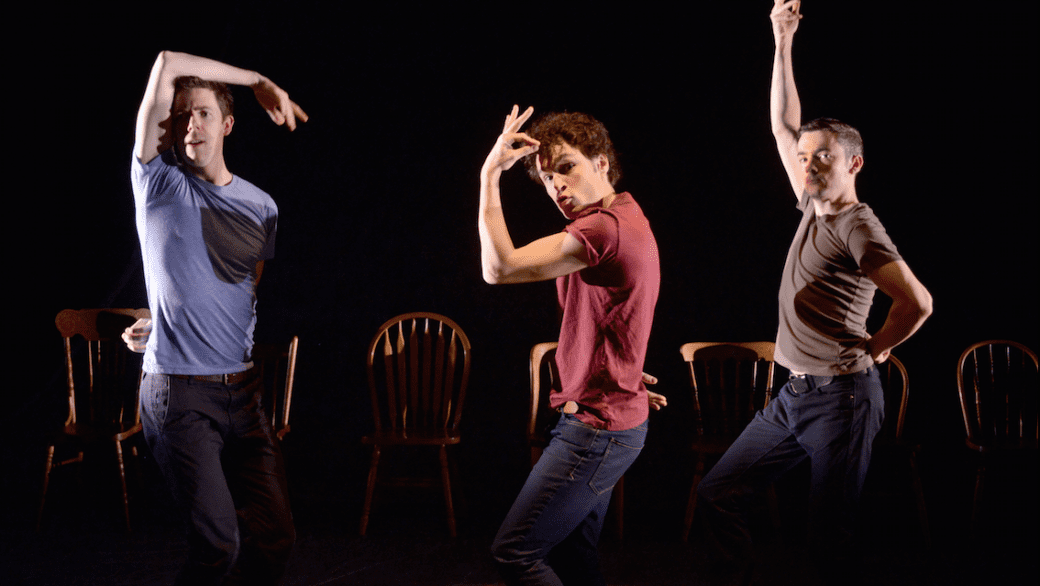Four years ago, three creator/performers came together with a question: is there such a thing as gay heritage? As opposed to gay history (a comprehensive document of our struggles and triumphs) the trio set out to examine whether they could draw connections between events from a queer past to a shared present and future.
Two workshops and one Dora-nominated production later, Damien Atkins, Paul Dunn, and Andrew Kushnir, are staging The Gay Heritage Project in Toronto again before bringing it to Edmonton, Vancouver and Victoria. Daily Xtra caught up with the boys to ask how the show has changed, questions around representation, and whether it’s a must-see for queer youth.
Daily Xtra: Since the last presentation, huge changes have occurred in queer life around the world. How have these social-cultural shifts shaped the piece?
Atkins: There are lots of changes to individual scenes, but the overall super-structure remains the same. Because we’re touring, we’re keeping an eye on making sure it remains a local because the investigation is really about us, and we’re situated in Toronto. But we want to make sure it’s accessible to other cities we’re going to. In terms of specifics, the trans movement has really exploded in a public way since the last run, so we’ve examined how to include that. Obviously it’s been around for a long time, but it’s become much more a part of the pop culture consciousness, so we want to reflect and celebrate that.
Kushnir: Many of the questions we’ve been turning over are of the irreconcilable variety, and are just as lively now as they were before. What does it mean to belong? Where do we come from? Who may be the heroes and adversaries that define us? What history can we lay claim to? We’ve always conceived of heritage as a verb, rather than a noun, a personal and communal practice, as opposed to something we figure out and present. It’s an act of collective imagination and everyone’s invited to the table.
When the show had its premiere, there were some rumblings within certain parts of the queer community about the problem of three gay white men creating a comprehensive account of queer history. What are you feelings about this?
Dunn: I think the value of the piece is in its portrayal of three individuals undertaking a personal exploration of heritage and their place in history. The seeking out of heritage is an action that anyone regardless of their identity can undertake. We deal with the fact we’re three gay white men of roughly the same age and we call it out. The question of whether there even is a queer community, of who gets to speak for it if such a thing exists, and the notion of our privilege are all intentionally called into the space.
Atkins: I always think it’s amusing, perplexing and a bit irritating when people have opinions about a piece before they’ve seen it. We’ve really tried to walk a fine line in terms of speaking for ourselves but not speaking exclusively of ourselves. The problem with a project like this is that if you only speak about your experience you’re accused of flaunting your privilege and if you speak inclusively you’re accused of appropriation of voice. So you’re caught in a kind of impossible situation. Functionally, when you’re faced with those kinds of competing opinions or ideologies, it can be very difficult to figure out the course of action. What we did with the play is really look at that question head on, while acknowledging we’re only a tiny segment of that spectrum.
Someone mentioned to me they thought queer youth needed to see this show more than anything else right now. What’s your reaction to that?
Dunn: I’d love for more young people to engage with the work. Over the years, teenagers have proven to be my favourite audiences. Their capacity for metaphor, for multiple meanings and perspectives, their appetite for a participatory theatre, one that acknowledges its audience and our contemporary moment, is huge.
Atkins: The show’s an invitation, not a kind of lecture. And the invitation is to investigate your own heritage. By portraying our investigation we hope to invite you to investigate your own heritage if you’re interested. But I don’t want to say that anybody must see this. I think the show is a real good time and there’s real value and substance to it. It would be very presumptuous to say someone of any age or identity has to attend this piece for whatever reason. However we’ve tried to make it as inclusive and invitational and pleasurable as possible, so that even if it’s not your heritage being examined, you might find links here and there, and hopefully have a really good time in the process.
(A previous version of this article mispelled Andrew Kushnir’s name as Kushner. It has since been fixed.)
The Gay Heritage Project
Wednesday, Jan 6–Sunday, Jan 31, 2016
Buddies in Bad Times Theatre, 12 Alexander St, Toronto
buddiesinbadtimes.com
Wednesday, Feb 10–Saturday, Feb 27, 2016
Citadel Theatre, 9828 101A Ave, Edmonton
citadeltheatre.com
Wednesday, March 3–Saturday, March 19, 2016
The Cultch, 1895 Venables St, Vancouver
thecultch.com
Tuesday, March 22–Sunday, March 27, 2016
The Belfry, 1291 Gladstone Ave, Victoria
belfry.bc.ca


 Why you can trust Xtra
Why you can trust Xtra


